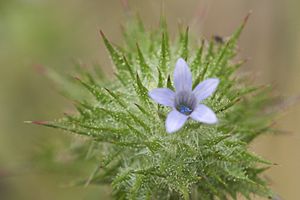Skunkbush facts for kids
Quick facts for kids Skunkbush |
|
|---|---|
 |
|
| Navarretia squarrosa | |
| Scientific classification | |
| Genus: |
Navarretia
|
| Species: |
squarrosa
|
| Synonyms | |
|
Gilia squarrosa (Eschsch.) Hook. & Arn. |
|
Navarretia squarrosa is a plant often called skunkbush, skunkweed, or California stinkweed. It gets these names because it has a strong smell, a bit like a skunk! This plant grows in North America.
It is an annual plant, meaning it lives for only one growing season. It spreads out and can grow between 10 and 60 centimeters (about 4 to 24 inches) tall. Its flowers are shaped like tubes and can be lilac-pink to deep blue. They are small, up to 12 millimeters (about half an inch) wide. These flowers grow in tight bunches at the top of the plant. Spiny leaves and bracts (small leaf-like structures) surround the flower heads. The plant's main leaves are also spiny and have deep lobes, looking a bit like feathers.
Where Skunkbush Grows
This plant is native to several places in North America. You can find it naturally in British Columbia (Canada), and in the U.S. states of Washington, Oregon, and California.
It has also spread to other parts of the world. For example, it now grows in Australia and New Zealand.
Skunkbush Habitats
Navarretia squarrosa usually grows in open areas. It likes wet, gravelly flats and slopes. You will often find it in places that are less than 800 meters (about 2,600 feet) above sea level.
One special place where this plant grows is near Carmel, California. Here, it is found in unique forests of Monterey Cypress trees.

